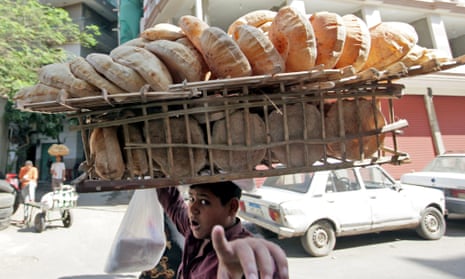When Egyptians took to the streets of Cairo three years ago, they called for “bread, freedom, and social justice”. Bread is absolutely central to the Egyptian diet, yet the country is massively dependent on others for supply. It imports almost twice as much wheat as all 27 EU member states put together, making it by far the largest wheat importer in the world.
Post-harvest waste of domestically grown wheat is high. The government calculates that between 20%–30% of harvested wheat never finds its way to market, but private estimates put the figure as high as 50% in some part of the country. “This is millions of dollars that we are losing,” says 49-year-old Khalid al-Hanafi, who became supply minister last March after a career as an economics professor.
So Hanafi has been given a generous budget, and the freedom to put in place some fairly radical policies, by a government that may be making debatable progress on freedom and social justice but which is determined to make sure no one runs out of bread ever again.
In order to achieve this Hanafi is currently finalising an £18m nationwide network of state-of-the-art grain storage facilities to keep government-purchased wheat. The first 105 of these shounas will open in April. “When we collect the wheat, we put it in open-air shounas, but this creates waste and a dramatic loss in quality,” he says, pointing to birds, humidity, air pollution and rodents as the main problem areas. These new storage facilities are temperature-controlled, as well as being equipped with primary processing capacity to screen, clean, dry and bag wheat as well as other grain products.
There’s even a command centre in Cairo, containing a software inventory management system and camera surveillance technology. David Blumberg of Blumberg Grain, the US specialist storage firm contracted to implement the project, claims the new system could save Egypt up to £130m per year. “The government can get a real-time view of the levels of inventory that they have across the entire shouna system,” says Blumberg.
Blumberg has installed similar storage infrastructure in Senegal, Nigeria and the Democratic Republic of Congo, and is currently in discussions with various state governments in India to implement storage facilities for rice, onion and potatoes, as well as wheat.
Post-harvest waste has become a high-profile issue in recent years and governments are increasingly keen to find ways to cut food waste at every level. In sub-Saharan Africa alone, the estimated food that is lost after harvesting could feed 48 million people and exceeds the total food aid to the region.
Egypt’s new initiative is not without challenges, however. The shounas, which were constructed by the army, will be under government control, leading to fears among some independent experts over possible mismanagement. “In private sector hands, the oversight and diligence in terms of managing the stock would be elevated,” says one agricultural expert close to the project. And there are still issues around the poor road, rail and other transport infrastructure connecting the storage facilities to Egypt’s main processing plants.
Meanwhile, up at the other end of the supply chain the government is trying some unusual initiatives in order to reduce consumer waste. Last April they began phasing in a smartcard system that aims to modernise the country’s long-established tradition of bread subsidies. Around 70 million of Egypt’s 90 million people are eligible for the smartcard system, which permits five loaves of bread per family member per day.
If cardholders opt not to claim all of their daily allowance, they gain tradable points that can then be used to purchase other staples or non-foodstuffs in government-registered stores.
“In the past, people would consume what they needed and throw away the remainder or [use the bread to] feed the birds or animals,” says Hanafi. “Now people are more rational … they wait each month to redeem their points.”
According to the ministry of supply, the points system provides poor Egyptians with an additional supplement for food purchases of between 40–50 Egyptian pounds per month (£3.50–£4.50). Bread demand, meanwhile, has reportedly dropped by between 15%–20% as consumers rationalise their consumption.
The new system, which Mohamed Mursi, Egypt’s previous president tried but failed to introduce, is scheduled to reach all Egypt’s 29 provinces by the end of this month. Jordan is among other regional governments said to be interested in adopting a similar approach.
Join our community of development professionals and humanitarians. Follow@GuardianGDP on Twitter.

Comments (…)
Sign in or create your Guardian account to join the discussion